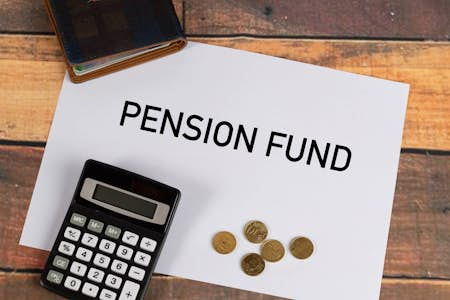You have countless options to save for retirement and grow your wealth. Increasingly, people are looking at SIPPs to accumulate cash for their pensions. They have their advantages, but they may not always be appropriate. That’s down to the financial products available to buy through a SIPP and the rules surrounding accessing the funds.
Here, we explore what SIPPs exactly are and what bonds are an option to buy through them. We investigate the world of fixed-rate bonds specifically while looking at other options for fixed income investing for your pension too.
Maximise your retirement fund with our panel of pension providers. Click on your chosen provider to get started!
What is a SIPP?
A SIPP, or Self-Invested Personal Pension, is a type of pension plan available in the UK that provides individuals with flexibility and control over their retirement savings.
Traditional pension plans from the investment management industry have investment decisions made by the plan provider and fund managers. A SIPP allows you, individually, to choose from a range of investments available in financial markets, such as stocks, bonds, and mutual funds, amongst other asset classes. A SIPP can be a valuable tool if you want to take a more active role in managing your retirement savings and have the expertise or desire to invest in a broader range of assets than traditional pension plans allow.
Anyone under the age of 75 can set up a SIPP, which can be funded with contributions from you, your employer, or both. The contributions are invested in your chosen investments, and the fund grows tax-free until retirement. You can access your SIPP at retirement by purchasing an annuity, taking a lump sum, or drawing down your funds as needed.
However, while they can be suitable for some, it is currently not possible to buy standard fixed-rate bonds, the most common type of fixed-rate bond, through a SIPP. They can be purchased directly from a bank or building society but are not protected under the tax rules of a SIPP.
So what are standard fixed-rate bonds?
Fixed-rate bonds are a type of investment product that offers a fixed interest rate for a set period, typically ranging from one to five years. Their interest rates are sometimes referred to as bond yields. They are issued by banks, building societies, and other financial institutions to raise capital. They are a popular option for investors who want a guaranteed return on their investment.
When you invest in a fixed-rate bond, you agree to lend a certain amount of money to the issuing institution for the specified term. In exchange, the institution pays a fixed interest rate on the investment, typically higher than the interest rates offered on savings accounts.
Because the interest rate on a fixed rate bond is set for the duration of the term, you are protected against decreases in interest rates during that time. However, it also means that you cannot benefit from any increases in interest rates during the term.
At the end of the term, you receive your original investment plus the accumulated interest. You can reinvest the funds in another fixed-rate bond or investment product. Due to their payment structure, fixed-rate bonds can be helpful if you are looking for a lower-risk, predictable return on your investment.
Other types of fixed-rate bond
Here are some alternatives that could be an option if you don’t want to buy a standard fixed-rate bond directly from your bank:
Cash ISAs
Technically speaking, cash ISAs work like bonds. They offer a fixed rate of interest for a set period of time. As with standard bonds, the interest rate is fixed for the duration of the term, and you can invest up to a certain amount tax-free each year. The interest you receive is free from income tax. These products are separate from SIPPs.
Index-linked bonds
Index-linked bonds are fixed-rate bonds where the interest rate is linked to an inflation index such as the Consumer Price Index (CPI). The interest rate is adjusted periodically to reflect changes in the index, meaning you are protected against inflation.
Government bonds
Government bonds, or sovereign bonds, are fixed-rate bonds governments issue to raise capital. In Britain, UK Government bonds are called Gilts, which HM Treasury issues. As with other bonds, they offer a fixed interest rate for a set period.
They are considered very low-risk investments as they are backed by a government's ability to repay the debt. As they are low-risk, Government bond yields or Gilt yields are generally lower than corporate bonds or other fixed-income products. Government bonds are often used as a benchmark for other fixed-rate bonds.
Corporate bonds
Corporate bonds are fixed-rate bonds issued by companies to raise capital. They offer a fixed interest rate for a set period of time and are typically riskier than government bonds or bank bonds because companies are perceived to have a higher chance of going bankrupt.
Can I invest in bonds via my pension fund?
Yes, as opposed to fixed-rate bonds, investing in bonds via your pension fund is possible. Many pension funds or pension schemes, including workplace pensions, personal pensions, and SIPPs, offer the option to invest in bonds through funds as part of their investment portfolio.
Investing in bond funds through a pension fund can be an excellent way to diversify your investment portfolio and spread the risk of your investments. Accessing the bond market, and government bonds, in particular, is considered to be lower-risk investing. As a result, bonds can be a useful tool for pension savers looking to balance risk and returns in their investment strategy.
Gilts, bonds and 2022
It is important to note that investing in Gilts and bonds comes with risks. The value of Gilts and bonds can be affected by changes in interest rates, inflation, and other economic factors.
Many painfully experienced that in the Autumn/Winter of 2022, when, despite their ‘safe-haven’ reputation, even Gilts encountered volatility and a mass sell-off after the mini-budget from Kwasi Kwarteng and Liz Truss. The Gilt market was hit hard, with Gilt prices plunging and other bond prices struggling too. The pensions industry was temporarily in turmoil as pension liabilities for the defined benefit/final salary products looked eye-wateringly expensive for pension funds to pay out.
A large part of that was down to many UK pension funds using Liability Driven Investments (LDI) as part of their portfolio construction. An LDI is an investment strategy used by pension funds to match the cash flows of their liabilities. LDI aims to ensure that the pension fund has sufficient assets to pay its liabilities as they become due. One common way that pension funds implement LDI is by investing in Gilts.
However, in September 2022, Government bond yields skyrocketed - causing those Gilt prices to plunge. As a result, pension schemes with LDI funds needed to give their investment managers collateral. However, the scale of the problem meant that many funds could not put up that collateral in the required time frame. The Bank of England (BOE) had to stop the markets from spiralling out of control and materially hurting people’s pension pots.
So, before investing in Gilts or any other type of investment through your pension fund, speaking to a financial advisor or pension provider is essential to ensure the investment is appropriate for your individual circumstances and investment goals.
What to consider when buying bonds for your SIPP
So, considering that bonds can be risky and fixed-rate bonds aren’t options for SIPPs, what should you consider when buying bonds for your pension fund?
Investment objective
Consider your investment objective and what you hope to achieve by investing in bonds. Are you looking for income, capital growth, or a combination of the two? This will help you determine which type of bond investment is most suitable for your SIPP.
Credit rating
Check the credit rating of the bond issuer. Bonds issued by companies or governments with higher credit ratings are generally considered lower risk and may offer lower returns. Conversely, bonds issued by companies or governments with lower credit ratings may offer higher returns but carry more risk.
Yield
Consider the yield on the bond, which is the interest rate paid on the bond in relation to its current market price. Higher yields generally indicate higher risk, so it's important to consider whether the potential returns are worth it.
Maturity
Consider the bond's maturity date, which is when the issuer is due to repay the bondholder. Longer-term bonds generally offer higher yields but carry more risk as there is more time for economic and financial conditions to change.
Diversification
Consider diversifying your bond investments by investing in bonds from different issuers, industries, and countries. This can help spread the risk and reduce the impact of any one bond investment performing poorly.
Fees
Consider any fees associated with buying and holding bonds in your SIPP, such as brokerage or custody fees. These fees can reduce your overall returns, so factoring them into your investment decision is essential.
Inflation
Consider the potential impact of inflation on your bond investments. Bonds are typically fixed-income investments, which means their returns are fixed at the time of purchase. If inflation rises, the actual value of your returns may decrease over time.
Accessing higher yields through your SIPP
Given that higher fixed-rate bonds aren’t options for your SIPP, how else could you access higher yields, like the short-term bonds you can buy at your bank?
Junk bonds
One option to potentially find higher yields on bonds is to consider investing in high-yield bond funds, also known as junk bond funds, which invest in corporate bonds with lower credit ratings. These bonds typically carry a higher risk of default but offer higher yields to compensate for the risk. Some high-yield bond funds may offer yields above 4%, but it's important to carefully research the bonds' underlying holdings and credit quality before investing.
Emerging market bond funds
Another option to consider is emerging market bond funds, which invest in bonds issued by governments and companies in emerging market economies. These bonds can offer higher yields but also carry more risk than bonds issued by more established economies. So, while some emerging market bond funds may offer yields above 4%, it's vital to carefully consider the risks and diversify investments across different regions and currencies.
Take into account the economic environment
Bond yields can fluctuate based on market conditions and changes in interest rates, so if you are keen on buying Gilts, it's possible that their yields may rise in the future. They are hugely dependent on what the UK’s central bank, the Bank of England, is implementing in terms of their monetary policy. To put a break on inflation and create financial stability, they are currently raising interest rates and have ceased the bond-buying quantitative easing that characterised the last decade.
Buying bonds for your SIPP and savings
Even though you may be subject to income tax, you may still want to consider fixed-rate bonds as part of your overall portfolio. That’s because you may not want all your funds saved in your pension. Accessing your pension pot comes with rules that may not suit your needs.
Short-dated fixed-rate bonds can be a great way to grow your money for closer-term financial needs. Plus, with increasing yields, many of them are also starting to look more attractive.
As of May 2023, the yields on Gilts and investment grade bonds have been historically low, and it may be challenging to find Gilt or bond funds that consistently offer yields above 4% - which many fixed-term bonds from a bank or building society currently do. Of course, the low rate reflects the quality of the institution backing the bond - in the case of Gilts, the UK Government. The lower risk still makes Gilts a consideration, at the very least.







